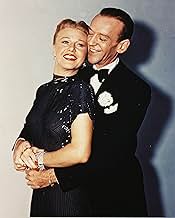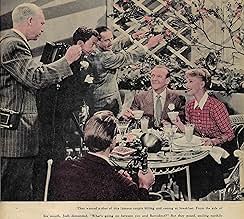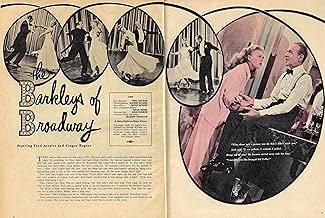AVALIAÇÃO DA IMDb
7,0/10
3,7 mil
SUA AVALIAÇÃO
Adicionar um enredo no seu idiomaA married musical team splits up so the wife can become a serious actress.A married musical team splits up so the wife can become a serious actress.A married musical team splits up so the wife can become a serious actress.
- Direção
- Roteiristas
- Artistas
- Indicado a 1 Oscar
- 3 vitórias e 4 indicações no total
Jacques François
- Jacques Pierre Barredout
- (as Jacques Francois)
John Albright
- Look Photographer
- (não creditado)
Jean Andren
- 1st Woman
- (não creditado)
Lois Austin
- Guest in Lobby
- (não creditado)
Dick Baron
- Bobby Soxer
- (não creditado)
Mary Bayless
- Guest in Lobby
- (não creditado)
Margaret Bert
- Mary
- (não creditado)
Betty Blythe
- Guest in Lobby
- (não creditado)
- Direção
- Roteiristas
- Elenco e equipe completos
- Produção, bilheteria e muito mais no IMDbPro
Avaliações em destaque
Except this vehicle is nothing like their other films at RKO. This is a MGM musical in the big MGM tradition. The whole thing was an accident. Judy Garland was supposed to have Ginger Rogers' role, but her chronic illness made a replacement necessary. Rogers and Astaire have the same old chemistry even if it is a different studio. They play feuding song and dance team Josh and Dinah Barkeley who break up personally and professionally over Dinah's desire to do dramatic acting and Josh's jealousy over who the author of the play is - a flirty Frenchman, Jacques.
At first Josh says he wants Dinah to fall on her face. But when he sees her actually stumble in rehearsals when he sneaks in to catch a peek, he blames it all on Jacques, who he says does not know how to direct her. So Josh comes up with a ruse in which he calls Dinah after rehearsals and pretends to be Jacques, complete with fake French accent, giving her cues on how to improve her performance based on what he has seen. Unfortunately it works too well. Dinah thinks even more of Jacques since he is helping her out with great tips, and Jacques is bowled over by Dinah's inexplicable improvement. How will this work out? Watch and find out.
Of course MGM spared no expense in the late 40s with the Arthur Freed unit, which made this film. There is beautiful Technicolor, comedy and masterful piano work from Oscar Levant, a great piece of special effects work by MGM and dancing by Astaire in the number "Shoes with Wings On" in which Astaire seems to be dancing side by side with pairs of tap shoes, and a ballroom number in which Fred and Ginger dance to "They Can't Take That Away From Me". Fred sang it to Ginger but the two did not dance to it in 1937's "Shall We Dance". Finally, Ginger's recitation of "La Marseillaise" when she plays "Young Sarah Bernhardt" in Jacques' play is a (probably) unintentional camp classic. Fortunately the French are forgiving people.
It was an unexpected reunion, but for fans of the big MGM musicals of the period and of Fred and Ginger in particular, I would highly recommend it.
At first Josh says he wants Dinah to fall on her face. But when he sees her actually stumble in rehearsals when he sneaks in to catch a peek, he blames it all on Jacques, who he says does not know how to direct her. So Josh comes up with a ruse in which he calls Dinah after rehearsals and pretends to be Jacques, complete with fake French accent, giving her cues on how to improve her performance based on what he has seen. Unfortunately it works too well. Dinah thinks even more of Jacques since he is helping her out with great tips, and Jacques is bowled over by Dinah's inexplicable improvement. How will this work out? Watch and find out.
Of course MGM spared no expense in the late 40s with the Arthur Freed unit, which made this film. There is beautiful Technicolor, comedy and masterful piano work from Oscar Levant, a great piece of special effects work by MGM and dancing by Astaire in the number "Shoes with Wings On" in which Astaire seems to be dancing side by side with pairs of tap shoes, and a ballroom number in which Fred and Ginger dance to "They Can't Take That Away From Me". Fred sang it to Ginger but the two did not dance to it in 1937's "Shall We Dance". Finally, Ginger's recitation of "La Marseillaise" when she plays "Young Sarah Bernhardt" in Jacques' play is a (probably) unintentional camp classic. Fortunately the French are forgiving people.
It was an unexpected reunion, but for fans of the big MGM musicals of the period and of Fred and Ginger in particular, I would highly recommend it.
The Barkleys of Broadway is directed by Charles Walters and written by Betty Comden and Adolph Green. It stars Fred Astaire, Ginger Rogers, Oscar Levant, Billie Burke, Gale Robbins and Jacques François. Music is by Lennie Hayton and cinematography by Harry Stradling Sr.
Fred and Ginger play the Barkleys, a successful husband and wife musical comedy team that seems to thrive on feuding. However, one day it goes too far and a break up appears certain when the wife entertains an offer from Jacques François to become a serious actress.
Firsts and lasts here as it was the first film Astaire and Rogers did for MGM, their first in colour, and their last they would make together after reconvening after 10 years - Rogers stepping in when Judy Garland fell to her troubled wayside. The screenplay is pretty thin, serving only as a thin piece of meat to the dance and musical numbers sandwich, but with stand-outs like the wonderful "Shoes with Wings On" and the joyous uplift of 'They Can't Take That Away from Me' to spend time with, it's a film to brighten the darkest of days. 7/10
Fred and Ginger play the Barkleys, a successful husband and wife musical comedy team that seems to thrive on feuding. However, one day it goes too far and a break up appears certain when the wife entertains an offer from Jacques François to become a serious actress.
Firsts and lasts here as it was the first film Astaire and Rogers did for MGM, their first in colour, and their last they would make together after reconvening after 10 years - Rogers stepping in when Judy Garland fell to her troubled wayside. The screenplay is pretty thin, serving only as a thin piece of meat to the dance and musical numbers sandwich, but with stand-outs like the wonderful "Shoes with Wings On" and the joyous uplift of 'They Can't Take That Away from Me' to spend time with, it's a film to brighten the darkest of days. 7/10
This is my first Astaire Rogers film and it was better than I expected. They are both good at the fast dialgue. Although older looking in this one, Ginger is pretty to look at. She has an intelligent wisecracking way about her in this film. It is fast paced and never lags. It is highly entertaining, and if this is one of their least watchable, I can't wait to see the others. The dialogue is quite witty. The storyline may be a little far-fetched, not exactly realistic, but a good picture. I enjoyed it more than some of the better known stuff. I would for instance take them over Hepburn and Tracy. They look good together visually. Someone did a clever job with their dressing table decor and attire. It is fun to watch them as they primp in front of the mirror and carry on with each other.
For their reunion and final screen pairing, Fred Astaire and Ginger Rogers were teamed again by MGM in The Barkleys of Broadway. They play a pair of musical comedy performers who do have their occasional spats off the stage.
One thing Arthur Freed at MGM did for the pair was give them a better and more mature story to work with than they ever did at RKO back in the Thirties. That was part of the charm though, you didn't really care about the silliness of the plots with music written by folks like, Kern, Gershwin, Porter, and Berlin.
As in real life Fred was the creative one of the pair and he's criticizing Ginger a bit too much at times. So much so that she's very receptive to French director Jacques Francois's overtures to star in a straight dramatic play about young Sarah Bernhardt. This presents quite the dilemma for Fred in his professional and personal life.
Harry Warren and Ira Gershwin wrote the score for The Barkleys of Broadway. I like very much the song You'd Be Hard To Replace it so fits Fred and Ginger for singing and dancing.
Creative continuity was established with the RKO films as They Can't Take That Away From Me which was introduced in Shall We Dance and written by Ira and George Gershwin sung and danced elegantly here. It's one of my favorite ballads ever.
Oscar Levant is his usual laconic and witty self here who inflicts the Saber Dance on party guests and later does Tschaikovsky's Concerto in B Flat in the grand and classical style. Levant's reputation as a wit overshadows his very real skill as a pianist, but not in this film. Also his close association with the Gershwin brothers gives some more official continuity with this film.
I suppose Fred and Ginger could have done more films together, but I suppose that in The Barkleys of Broadway they left their fans on a high note. They'll never dancing partners like them ever again.
One thing Arthur Freed at MGM did for the pair was give them a better and more mature story to work with than they ever did at RKO back in the Thirties. That was part of the charm though, you didn't really care about the silliness of the plots with music written by folks like, Kern, Gershwin, Porter, and Berlin.
As in real life Fred was the creative one of the pair and he's criticizing Ginger a bit too much at times. So much so that she's very receptive to French director Jacques Francois's overtures to star in a straight dramatic play about young Sarah Bernhardt. This presents quite the dilemma for Fred in his professional and personal life.
Harry Warren and Ira Gershwin wrote the score for The Barkleys of Broadway. I like very much the song You'd Be Hard To Replace it so fits Fred and Ginger for singing and dancing.
Creative continuity was established with the RKO films as They Can't Take That Away From Me which was introduced in Shall We Dance and written by Ira and George Gershwin sung and danced elegantly here. It's one of my favorite ballads ever.
Oscar Levant is his usual laconic and witty self here who inflicts the Saber Dance on party guests and later does Tschaikovsky's Concerto in B Flat in the grand and classical style. Levant's reputation as a wit overshadows his very real skill as a pianist, but not in this film. Also his close association with the Gershwin brothers gives some more official continuity with this film.
I suppose Fred and Ginger could have done more films together, but I suppose that in The Barkleys of Broadway they left their fans on a high note. They'll never dancing partners like them ever again.
Bickering husband and wife musical comedy team break up over her ambitions to become a dramatic actress. Final Fred & Ginger movie and their only film in color. Doesn't seem to get a lot of love but I enjoyed it. Fred and Ginger still play well off of each other, though admittedly the script doesn't have any of the sexual tension or playful banter of their more classic films. The bickering is nowhere near as bad as other reviewers have said, though. I felt the relationship between the two was very loving.
Ginger is absolutely gorgeous in Technicolor. I can't remember her ever looking so radiant. Her wardrobe was great, too. Speaking of beauties, I have to mention lovely Carol Brewster who had a small part but caught my eye. She looked quite fetching as well. Cutie Gale Robbins is fun as Ginger's understudy. Oscar Levant is great as their friend. He also has a couple of nice piano numbers.
The musical numbers are good. The Scottish number, Fred's solo number, and "They Can't Take That Away from Me" were all excellent. But whose brilliant idea was it to ruin the opening (and probably best) dance number by putting the opening credits over it? Regardless, it's a good movie with some solid musical numbers, luscious Technicolor, and the great Fred & Ginger in their last film.
Ginger is absolutely gorgeous in Technicolor. I can't remember her ever looking so radiant. Her wardrobe was great, too. Speaking of beauties, I have to mention lovely Carol Brewster who had a small part but caught my eye. She looked quite fetching as well. Cutie Gale Robbins is fun as Ginger's understudy. Oscar Levant is great as their friend. He also has a couple of nice piano numbers.
The musical numbers are good. The Scottish number, Fred's solo number, and "They Can't Take That Away from Me" were all excellent. But whose brilliant idea was it to ruin the opening (and probably best) dance number by putting the opening credits over it? Regardless, it's a good movie with some solid musical numbers, luscious Technicolor, and the great Fred & Ginger in their last film.
Você sabia?
- CuriosidadesFred Astaire had sung "They Can't Take That Away from Me" to Ginger Rogers previously in Vamos Dançar? (1937), but they had never danced to it. Rogers suggested that they use the song again (this time dancing), and so it was included.
- Erros de gravaçãoIn "Shoes With Wings On" dance, one dancer has his shoes off when trying the tap shoes. When he takes them off and gives them to Fred Astaire's character, the dancer forgets to pick up his shoes when he walks out the door. After that, they are not to be found when the routine continues.
- Citações
Ezra Millar: Thank you. I'm touched, the piano's touched, and Tchaikovsky's touched.
- ConexõesEdited into Hollywood: The Dream Factory (1972)
- Trilhas sonorasThey Can't Take That Away from Me
(1937)
Music by George Gershwin
Lyrics by Ira Gershwin
Sung by Fred Astaire (uncredited)
Danced by Fred Astaire (uncredited) and Ginger Rogers (uncredited)
Principais escolhas
Faça login para avaliar e ver a lista de recomendações personalizadas
- How long is The Barkleys of Broadway?Fornecido pela Alexa
Detalhes
- Data de lançamento
- País de origem
- Idiomas
- Também conhecido como
- The Barkleys of Broadway
- Locações de filme
- Empresa de produção
- Consulte mais créditos da empresa na IMDbPro
Bilheteria
- Orçamento
- US$ 2.325.420 (estimativa)
- Tempo de duração1 hora 49 minutos
- Proporção
- 1.37 : 1
Contribua para esta página
Sugerir uma alteração ou adicionar conteúdo ausente

Principal brecha
By what name was Ciúme, Sinal de Amor (1949) officially released in India in English?
Responda






























